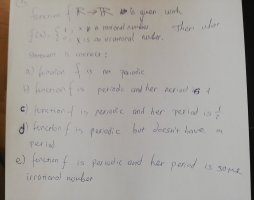You are using an out of date browser. It may not display this or other websites correctly.
You should upgrade or use an alternative browser.
You should upgrade or use an alternative browser.
Partial function periodic
- Thread starter Loki123
- Start date
blamocur
Elite Member
- Joined
- Oct 30, 2021
- Messages
- 3,222
Function's image, a.k.a. range, is irrelevant to its periodicity. E.g., if [imath]f[/imath] were defined as being 5 for rational and 17 for irrational then the answer to the problem would be the same.
Can you provide the definitions from your class for a) periodic function, and b) function's period ?
Can you provide the definitions from your class for a) periodic function, and b) function's period ?
I don't have it unfortunately. This is not a part of the class. I am trying to learn it on my own.Function's image, a.k.a. range, is irrelevant to its periodicity. E.g., if [imath]f[/imath] were defined as being 5 for rational and 17 for irrational then the answer to the problem would be the same.
Can you provide the definitions from your class for a) periodic function, and b) function's period ?
blamocur
Elite Member
- Joined
- Oct 30, 2021
- Messages
- 3,222
Where did you get the problem from?
If you look at https://en.wikipedia.org/wiki/Periodic_function, they distinguish "a period", of which there can be many, and "the fundamental period". I am guessing your question is about the latter.
If you look at https://en.wikipedia.org/wiki/Periodic_function, they distinguish "a period", of which there can be many, and "the fundamental period". I am guessing your question is about the latter.
The correct answer depends on the EXACT definition of periodic used by whoever posed the problem. Using the first paragraph of the Wikipedia definition cited above, this Dirichlet function is not periodic because it has no constant period. However, if you look up the Dirichlet function on Wikipedia, it says it is periodic. Everything depends on what definition you use.
I am unfamiliar with the terms. I know the answer is d. What definition does that fit?The correct answer depends on the EXACT definition of periodic used by whoever posed the problem. Using the first paragraph of the Wikipedia definition cited above, this Dirichlet function is not periodic because it has no constant period. However, if you look up the Dirichlet function on Wikipedia, it says it is periodic. Everything depends on what definition you use.
blamocur
Elite Member
- Joined
- Oct 30, 2021
- Messages
- 3,222
I don't think it is productive to try solving the problem without understanding the definitions. And when there is more than one definition I would pick one and solve the problem for it.I am unfamiliar with the terms. I know the answer is d. What definition does that fit?
but i do not know the definitions, and while i can look them up, they don't give a clear idea on how to solve this problem.I don't think it is productive to try solving the problem without understanding the definitions. And when there is more than one definition I would pick one and solve the problem for it.
blamocur
Elite Member
- Joined
- Oct 30, 2021
- Messages
- 3,222
You should look them up, and in case of ambiguity be clear in your post which definition you are using.but i do not know the definitions, and while i can look them up, they don't give a clear idea on how to solve this problem.
It would be very convenient if definitions gave us clear ideas about solutions, but, unfortunately, they rarely do.

